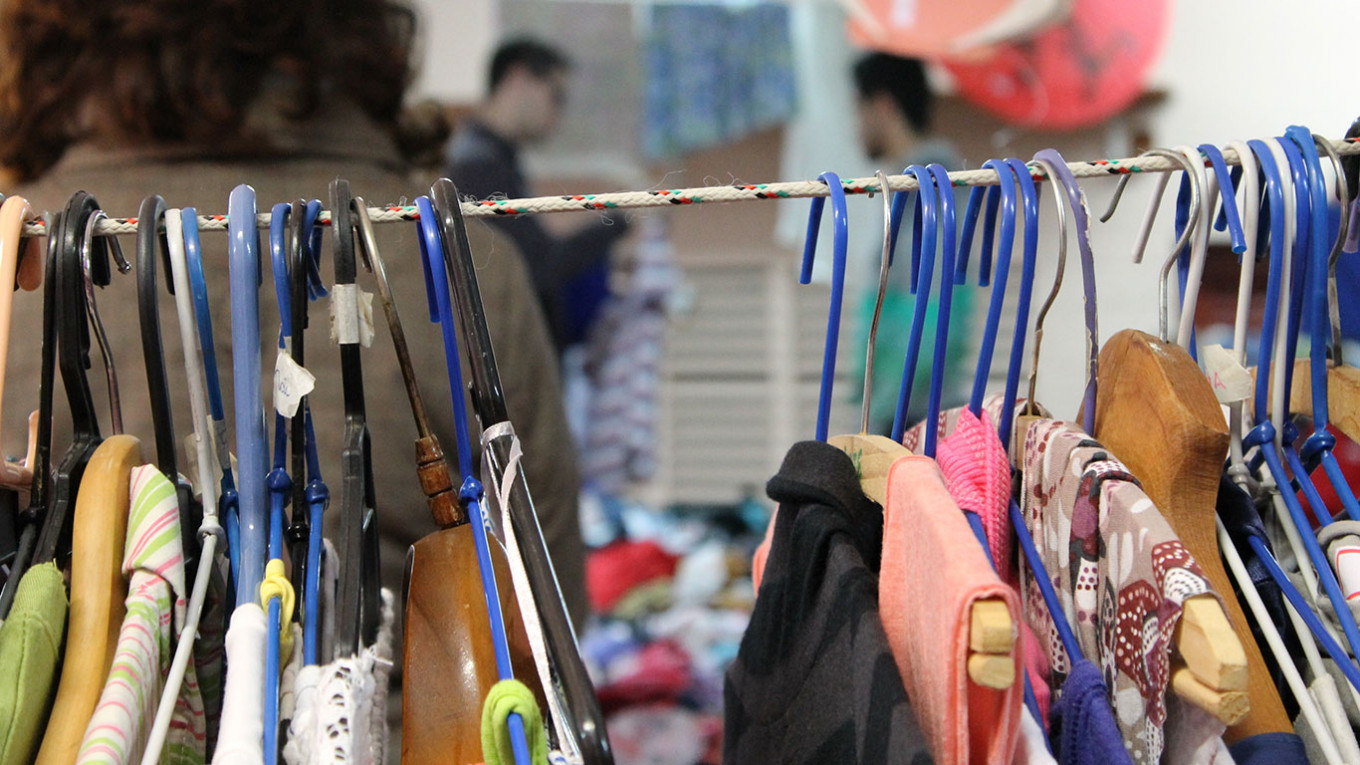Хенд мейд: handmade goods
It’s time to talk about borrowed words again.
The problem is not that Russians grab handfuls of foreign words — mostly English — and drop them into their native language without warning or explanation, or that there are already Russian equivalents for those words, or that if there aren’t equivalents it’s perfectly possible to invent them in Russian. Well, these are all problems, of course, but the big problem is that the meaning of the borrowed word changes in Russian. Everyone forgets this. People don’t understand one another. Translations are a mess.
In short: Communication chaos ensues.
For example, if I told you “I put glamorous tiles in my kitchen” wouldn’t you be confused? Or if I said, “There’s a new secondhand on the corner,” wouldn’t you be perplexed?
Borrowed words not only change their meaning in Russian, they often change what part of speech they are.
Take secondhand. In English it can be an adjective (secondhand ideas) or an adverb (I heard about it secondhand). Spelled second hand, it can be a noun that means more help (I could use a second hand in the kitchen) or part of a clock (the second hand was on four).
But in Russian секонд-хенд is a noun. The most common meaning is a store selling used clothing, like in this brain-warping newspaper headline: Нью-винтаж: 30 московских секонд-хендов (New Vintage: 30 Moscow Secondhand Clothing Stores). It also means second-hand clothes themselves, usually as a collective noun: Безопасно ли носить секонд-хенд? (Is it safe to wear secondhand clothes?)
Another word that changed its part of speech when it arrived at the Russian language border is хендмейд (also spelled хенд мейд and хенд-мейд). Handmade is an adjective in English, but in Russian it’s a handmade item: Популярность хендмейда — это стремление к уникальности (The popularity of handmade objects is the longing for something unique).
And here is an example of another quirk of contemporary Russian usage: using both the native Russian word — which is absolutely, totally, completely sufficient — and the borrowed English word: Магазины ручной работы и хенд мейд в Москве (Stores selling handmade goods and handmade goods in Moscow).
Гламурный, from glamorous, has been around for a long time. The English word is, I have found, hard to translate. It means “attractive and interesting in an exciting and unusual way” and has a bit of its original meaning of magic or enchantment in it. I’ve always found it difficult to explain why, say, Lauren Bacall was glamorous but the equally beautiful Julie Andrews was not. Glamour seems to have a bit a danger or artifice in it; wholesome is not glamorous.
In Russian гламурный didn’t appear to mean much of anything at first – it was just a catch-all word that meant something attractive, expensive, possibly Western, definitely trendy. Now, about 20 years after it appeared, its definition has more or less coalesced: демонстративная роскошь (ostentatious luxury). So У неё гламурная собачка is not “she has a glamorous dog” — although it’s possible the dog is glamorous in its fur coat and diamond collar. But it probably means “she has an expensive, trendy dog.” And Традиционно "Макдоналдсы" не конкурировал с гламурными ресторанами is probably something like “Traditionally McDonald’s didn’t try to compete with haute-cuisine restaurants.”
Another fun word is стретч (sometimes стрейч) from the English stretch. Forget most of the English meanings. In Russian it has two main meanings. One is the short form of стретч-плёнка (in English, depending on location, this is plastic wrap, cling film, Saran wrap, or cling wrap). Стретч-плёнка – это прозрачный, самоклеящийся без клеевой основы паковочный материал (Stretch wrap is transparent packing material that is self-adhering although it doesn’t contain glue). Kind of magical, isn’t it? But too cheap and ubiquitous to be гламурный.
The other meaning is a kind of stretchy material. Russian fabric-makers and clothes companies seem a bit miffed that people don’t understand what стретч is. Это не название ткани, а её характеристика (It’s not the name of fabric but its feature). Слово используется как приставка к основному виду ткани: стрейч-лён, стрейч-коттон (The word is added as a prefix to the main type of fabric: stretch linen, stretch cotton.) But then we see that there was really no need to borrow the word: Термин означает, что она обладает хорошей растяжимостью (The term means that it has good elasticity). And then we have our favorite repetition and more unnecessary borrowings: Эластичный стрейч-коттон состоит из волокон хлопка и эластичных добавок (Elastic stretch cotton is made of cotton fibers and an elastic additive).
You can see why this is so annoying for many people.
Finally, we come to провокация (provocation) and провокатор (provocateur). In English and Russian dictionaries, the meanings are actually quite similar: a provocation is an act or speech designed to make someone angry and prompt retaliation. A provocateur is the person who commits it.
But in speech and texts, especially about the arts, the meaning has been tamed down and can now be nothing more dangerous than a slightly naughty little joke that might get a reaction. Often it’s about something (sexually) provocative: Выступление — яркая, весёлая, романтичная провокация (The performance is dazzling, fun, romantic and provocative). There is even a board game called Провокатор (provocateur) in which players draw cards with provocative questions meant to get a rise out of their partners.
The other meaning is an act that provokes a reaction or action, often positive or creative. For example, В школе мы устраивали провокации для детей (At school we did things to spark the children’s creativity).
Or провокация might be just a joke to get a reaction. In a short story a man is riding on the metro with his briefcase open. He explains: Это провокация! Над ворами издеваюсь! Полезут, а там пусто (I’m trying to get a rise of robbers! I’m playing a trick on them. They put their hand in, and it’s empty!)
Now, there’s nothing wrong with this. People own their language: they grab a word and run with it, changing its meaning along the way. But we translators have to run with them. Otherwise we have teachers acting as agents provocateurs and cabaret acts inciting violence.
And that’s just not right!
A Message from The Moscow Times:
Dear readers,
We are facing unprecedented challenges. Russia's Prosecutor General's Office has designated The Moscow Times as an "undesirable" organization, criminalizing our work and putting our staff at risk of prosecution. This follows our earlier unjust labeling as a "foreign agent."
These actions are direct attempts to silence independent journalism in Russia. The authorities claim our work "discredits the decisions of the Russian leadership." We see things differently: we strive to provide accurate, unbiased reporting on Russia.
We, the journalists of The Moscow Times, refuse to be silenced. But to continue our work, we need your help.
Your support, no matter how small, makes a world of difference. If you can, please support us monthly starting from just $2. It's quick to set up, and every contribution makes a significant impact.
By supporting The Moscow Times, you're defending open, independent journalism in the face of repression. Thank you for standing with us.
Remind me later.








